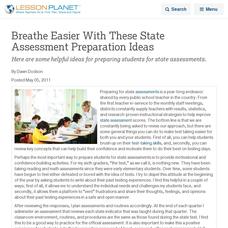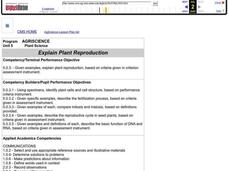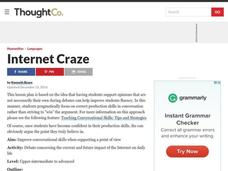Curated OER
Note Study of the Giver
Students, after reading The Giver, create a PowerPoint presentation, a Web page, and a newsletter or brochure demonstrating their understanding of the novel?
Curated OER
The Art of Charity in Characterization
High schoolers garner knowledge of characterization of the pilgrims in Chaucer's Canterbury Tales and see that even the less savory characters must be flushed out in description of personality and physical traits.
Curated OER
Managing the Teaching-Learning Process
Twelfth graders begin to recognize how 2,400 year-old dramas are applicable to their lives after reading OEDIPUS THE KING, AGAMEMNON, ANTIGONE, MEDEA, HIPPOLYTUS, and FROGS.
Curated OER
Students as Editors
Students read poems from a variety of authors. They write biographies of each poet and create a book full of the biographies and poems. They share their creation with the class.
Curated OER
Walking With Thoreau
Students engage in a series of activities geared towards studying the author Henry David Thoreau. They use different sources to obtain information to create context for future lessons. Students attempt to model their own lives to that of...
Curated OER
What Is Hot?
Middle schoolers explore why: Schools are hotbeds of popular young opinion about what to wear, which music to listen to, and what TV shows to watch. In this activity, students extend their fascination with "what's hot" to the books they...
Curated OER
ICT Activity 3
Students use KidPix to draw pictures, they are shown how to select and use different tools. They become aware of to use the keyboard to enter text. Students comprehend that their work can be saved and retrieved. They are introduced to...
Curated OER
Sharing
Students solve problems based on sharing scenarios. In this sharing lesson plan, students listen to a book on sharing and answer questions. Then the teacher presents different scenarios to the class and they have to problem solve to come...
Curated OER
Intermediate Synonyms and Antonyms #10
In this synonyms and antonyms worksheet, students choose the best synonym for the first 6 words and the best antonym for the next 6 words.
Curated OER
Using Writing to Make a Difference
Students change the lesson plan in order to make meaningful writing.
Curated OER
Breathe Easier With These State Assessment Preparation Ideas
Here are some helpful ideas for preparing students for state assessments.
Curated OER
Maintaining Student Motivation in Novel Studies
You can maintain student motivation through independent book study.
Curated OER
Literary Elements Worksheets and Graphic Organizers
Using graphic organizers can be an effective way to teach literary elements.
Curated OER
Wildflower Beautification Project
Young scholars, in cooperative groups, design and create a wildflower garden for the community. They write letters to property owners requesting use of their land and then write invitations to their parents and to local, state, and...
Curated OER
Plant Reproduction
Students plant seeds in order to investigate and explore the questions: "How do seed companies develop varieties of plants?" and "What is the ideal plant?" Students will study related vocabulary and sketch seeds as they emerge. Students...
Curated OER
Rainbow Fish Graphing
Students graph different colors of rainbow fish scales after participating in a shared reading of The Rainbow Fish. They answer questions based on the graph. They practice making graphs independently using colored cereal circles.
Curated OER
Writing an Informal Letter
What is the difference between formal and informal letter writing? Who gets a formal letter? What about an informal letter? This reference page presents different introductions and phrases you might see in each type of letter, and then...
Curated OER
Conversation Lesson: Internet Craze
Learning to support your opinions, debate, build arguments, and effectively respect another's point of view are vital skills. Learners work through a series of topics to practice discussion engagement and verbal communication.
Nazareth College
Chronological Order
First, next, and last, the elements of chronological order. In every story or text one can find a series of events that occur one after the other. To help learners with visual impairments conceptualize chronological order, this lesson...
Curated OER
Conversation Lesson: Men and Women - Equal at Last?
Young scholars engage in a debate about equality between men and women as a way to work on their conversational skills. The format of the debate is imbedded in this plan.
Curated OER
Weather Watchers - Interdisciplinary
Learners investigate weather and climate through a variety of interdisciplinary activities.
Curated OER
ESL Integrated Literature Unit
Students read and analyze information related to the book Island of the Blue Dolphin. They select appropriate information for the purpose of investigating part of the book.
Curated OER
The Renaissance
In this Renaissance worksheet, students read a 2 page article covering The Renaissance period, answer 5 facts with multiple choice answers and answer 5 statements true or false.
Curated OER
Chinese Dialect Exercise
Students are exposed to the obstacles in communication created by the presence of dialects, and made aware of the usefulness of a common writing system available to speakers of all dialect forms.

























